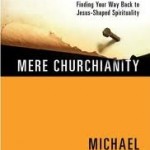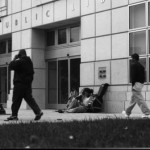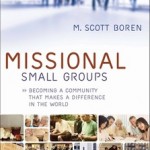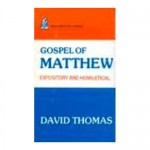Using Jesus to Promote Churchianity
First, I am extremely impressed with Waterbrook Multnomah’s Blogging for Books program. It was only 5 days ago that I posted my review on “Blogging for Books” (see my review of Under the Overpass) and ordered my next free review book, Mere Churchianity by Michael Spencer.
Believe it or not, that book arrived yesterday, and I started reading it last night.
Already, I can tell that Spencer has a good understanding of modern, traditional church culture.
I loved this statement:
“Jesus is used as a symbol to approve what we already are, to bless what we are already pursuing, and to prefer the people we are most similar to.”
I’m looking forward to Spencer’s answer. Since I followed his blog when he was alive, I think he’ll point us toward “Jesus-shaped spirituality.” I’m interested to see how he defines this in the book.
Anyway, if you haven’t signed up for Blogging for Books yet, you definitely should. This is a great program for bloggers who love to read. In fact, my wife, Margaret, even decided to sign up and start writing reviews.
Through the eyes of the homeless
Have you ever wondered what the homeless (and others in need) think about our theological discussions, arguments about the Bible, and other “churchy” stuff?
Yesterday, I reviewed Under the Overpass by Mike Yankoski. In the book, Mike tells the story of how he and Sam lived as homeless people on the streets of six cities over 5 months. Mike and Sam are both 20-something Christian men. But, in the book, we get a glimpse of what the homeless see of us (even from a Christian perspective).
Here is one excerpt:
Suddenly a young family came into view. The dad – dressed in t-shirt, shorts, and a baseball cap – walked in front, but he was looking down, evidently listening to his wife. She came along behind pushing the stroller. As they rolled up to us, a small boy in the stroller looked out at me.
When you’re sitting on a sidewalk, you’re at eye level with babies and kids… While kids might pretend people who don’t exist do, it’s the parents who pretend that unwanted people who do exist don’t.
I held the boy’s gaze for a while and gave him a smile, which he immediately returned. From high above him, his mother said something that caught my attention. “We have to be about the gift of giving and the wisdom of the Holy Spirit,” she said.
I looked up quickly, wondering what those words might mean, what with us sprawled on the sidewalk not five feet from her. But when I caught her eye, she looked away and quickened her pace.
Now the family was well past us. But the boy in the stroller still looked straight at me… (p. 55-56)
And, here’s another excerpt:
Although Sam and I spent every Sunday morning at a church somewhere on our travels, the lack of community was taking a toll on us. Even at church, we felt isolated because of how we looked, how we smelled, and who people perceived us to be. In fact, walking into a church where we hoped to find genuine fellowship only to be met by condescension or suspicion or disingenuous flattery was the worst kind of rejection. (p. 150-151)
I hope these excerpts (and the entire book if you choose to read it) will spur all of us on to noticing the people around us, and then spending time with the people we see.
Next Free Book: Mere Churchianity
Well, since I wrote my review of Under the Overpass for WaterBrook Multnomah, I can now order another new book from the Blogging for Books program.
While there were several good options, I decided to request Michael Spencer’s book Mere Churchianity: Finding Your Way Back to Jesus-Shaped Spirituality. (And, the book is already queued for shipment and should be here in a week or so.) Click the link above for the publisher’s description of the book.
I always enjoyed reading Spencer’s writing (even if I didn’t always agree with him) as the Internet Monk before he died last year. So, I’m looking forward to reading and reviewing this book.
If you blog and like to read, you should definitely sign up for Blogging for Books. (No, I do not get anything if you sign up. I just think it’s a great program for bloggers and want to share it with my readers.)
“Be fully present in the places where people are most broken.”
What happens when a couple of 20-something Christians decide to spend 5 months in six cities living as homeless people? Mike Yankoski and Sam Purvis decided to find out.
Mike tells part of their story in his book Under the Overpass: A Journey of Faith on the Streets of America (Multnomah Books: Colorado Springs, 2010). The book was originally published in 2005, and has be re-released in 2010 in an “updated and expanded edition” which includes a forwards by Francis Chan, a new epilogue, and a Q&A section.
The journey towards five months of homelessness begins with a realization:
The idea had dropped into my brain on Sunday morning while I sat in church. The pastor was delivering a powerful sermon about living the Christian life. The gist of it was, “Be the Christian you say you are.”
Suddenly I was shocked to realize that I had just driven twenty minutes past the world that needed me to be the Christian I say I am, in order to hear a sermon entitled, “Be the Christian you say you are.” (p. 4)
That triggered a desire in Mike to serve those who he normally ignored, that is, the homeless.
The book is divided into eight sections: An introduction; a section for each city in which Mike and Sam lived as homeless (Denver, Washington D.C., Portland, San Francisco, Phoenix, and San Diego); a Conclusion; an epilogue; and a Q&A. It is easy to read and hard to put down. Mike does not try to give every detail of their 5 month journey. Instead, in each city, he focuses on how certain people or events affects their lives on the street.
For example, at one point early in the story, Mike writes:
If we are the body of Christ – and Christ came not for the healthy but the sick – we need to be fully present in the places where people are most broken. And it has to be more than just a financial response. (p. 36-37)
Mike freely admits that he and Sam were not truly homeless. They always had an emergency contact in each city. However, they never used the emergency contact, and they ate, slept, panhandled, etc. with the homeless of each city.
One of the most poignant encounters (to me) happened in a deli. Mike and Sam were enjoying the air conditioning in the deli when a group of people walked in. They sat opposite the two “homeless” men and started talking about their love for the Bible. Mike decided to talk with them as they exited the deli, but the entire group looked away when they walked by them.
The conclusion, epilogue, and Q&A chapters are much more than simply add-ons. They are important to understanding how this journey affected Mike and Sam. Also, they offer great advice for those who may be interested in helping the homeless – hopefully, that will be many more people after reading this book.
I would recommend this book to everyone – old and young alike. At times you will be angry; at times you will praise God for his goodness. But, if you are like me, you will constantly be challenged to consider who you may be ignoring every day.
(I received this book for free from WaterBrook Multnomah Publishing Group for this review as part of their Blogging for Books program.)
(Please consider rating my review below or at the WaterBrook Multnomah site here.)
Serving Incarnationally
As I mentioned a few weeks ago, I joined “Blogging for Books.” When I joined, I requested the book Under the Overpass by Mike Yankoski. I did not know much about the book, but the premise looked interesting.
Mike and his friend Sam spent five months living among the homeless of different cities as homeless people. (Obviously, there were differences, as Mike indicates in his book.)
When I finish reading the book – which should not take much time – I will post a review here.
But, for now, I was wondering what my readers thought about the premise. What do you think about two people choosing to be homeless in order to learn more about homelessness? Pros? Cons?
Books for Studying NT Greek Addendum
Dave Black wrote a new essay called “Ten Best Books for Studying New Testament Greek.” His list is great! But, because of his humility, his list is missing some of the best books for studying New Testament Greek.
First, if you are studying NT Greek, you should definitely have Black’s grammar Learn to Read New Testament Greek. Black uses a morphological approach that makes the language easier to learn and understand.
Also, you should pick up a copy of Black’s short (but extremely helpful) book It’s Still Greek to Me. This is an intermediate grammar that digs deeper into the nuances of nouns, verbs, prepositions, pronouns, etc. in a manner that is still easy to understand and fun to read.
Black’s other introductory books are also very helpful. For example, get Using New Testament Greek in Ministry for help in exegesis and teaching, New Testament Textual Criticism: A Concise Guide for an introduction to the often complex subject of textual criticism, and Linguistics for Students of New Testament Greek for an introduction to the field of linguistics and discourse analysis.
For an even more detailed analysis of some of these same subjects, read Black’s (as editor) Linguistics for Students of New Testament Greek and Interpreting the New Testament.
So, there you have it. Add this books to Dave Black’s ten, and you’ve got a great library for studying New Testament Greek.
Are we going to be satisfied?
James at “Idle musings of a bookseller” recently started reading the book Missional Small Groups. He recommended that I read the book, and then he started posting a few excerpts on his blog. If the past is any indication, he’ll continue to post excerpts (probably after ETS and SBL).
Here’s part of the latest excerpt from his post “There must be more“:
If we don’t live in a way that is distinctive from our culture, then why not? If we are going to be satisfied with living our lives like the rest of the world and adding a weekly sermon and a small group Bible study on top, then what exactly are we up to in the church? Isn’t there more?
The excerpt begins (part that I didn’t quote) by noting that the rhythms of the lives of most people (including Christians) are “shaped by the broader culture.” It’s true. I’ve seen it in my own life and in the lives of others.
Are we satisfied with that? Are we willing to break those rhythms and step into a new kind of life? It won’t happen until we stop thinking first about ourselves and our desires and even our needs.
Are we going to be satisfied?
Blogging for Books
Do you like to read books? Do you want to get free books?
If you have a blog, and if you’re willing to write a review, WaterBrook Multnomah Publishing Group will send you free books through their “Blogging for Books” program.
Apparently, the program was around before, but has recently been revamped.
Jump over the site, sign up, and request your first book.
I decided to request Under the Overpass by Mike Yankoski, primarily because the topic looks interesting and because no one has reviewed it on the site yet.
There are several popular books available as well, such as Radical by David Platt and Mere Churchianity by Michael Spencer. I may request one of those books next.
Craig Blomberg on the Meaning of ekklesia
Following my previous post (“David Thomas on the Meaning of ekkklesia“), I thought I would post a quote from a more recent commentary.
This time, the quote is from Craig Blomberg in his commentary on Matthew (NAC 22; Nashville: Broadman, 1992). Blomberg is commenting on Matthew 16:16-18. He defines the Greek term á¼ÎºÎºÎ»Î·ÏƒÎ¯Î± (ekklesia – normally translated “churchâ€) here because it is the first occurrence of the term in the Gospel of Matthew.
Here is the quote:
So what does Jesus promise Peter? He will be the foundation on which Christ will build his “church.” Here is the first use of ekklesia in the Gospels. It occurs only three times, all in Matthew, and the other two references are both in 18:17. Many hold that Jesus did not conceive of establishing a church and that these verses are later Matthean insertions. But the nature of Jesus’ instruction to his community of followers certainly implied their continued existence in some form, even if there is little of an “institution” yet in view. Moreover, the word ekklesia in Hellenistic Greek often simply meant an assembly… The popular view that the church is somehow to separate itself from society, based on the derivation of ekklesia from ekkaleo (to call out) affords a classic example of what linguists call the etymological fallacy. Words often develop meanings over time that differ from their roots. They only sense in which the word church in New Testament times means those who are called out is that believers routinely gather together by leaving their separate places of residence or work. (p 252-53) (italics in original)
Blomberg explains that the ekklesia (assembly) of God is different from all other ekklesiai because it is composed of those who submit themselves to the rule of God in their lives (i.e., the kingdom of God).
David Thomas on the Meaning of ekklesia
David Thomas (1813-1894) first published his commentary on The Gospel of Matthew at the end of the nineteenth century. I ran across this commentary in my research for my dissertation.
In his comments on Matthew 18:15-20, Thomas begins by defining the Greek term á¼ÎºÎºÎ»Î·ÏƒÎ¯Î± (ekklesia – normally translated “church”). He defines the term here because it is one of only two occurences of the term á¼ÎºÎºÎ»Î·ÏƒÎ¯Î± (ekklesia) in any of the four Gospels.
Here are his comments:
It seems necessary, at the outset or our endeavour to reach and develop the spirit of this passage, to get a clear and a definite idea of the thing which Jesus here designates á¼ÎºÎºÎ»Î·ÏƒÎ¯Î± —the church. It is scarcely necessary to remark that the simple meaning of the word is an assembly… The term is never used to designate a building, a class of religious functionaries, or a system either of doctrine or of worship. In the Christian sense it means nothing more than an assembly of Christians. The assembly may be large or small, held in a city or a village, in a public building or in the open air. (pg 359) (italics in original)
The more I read older commentaries, the more I find comments and definitions like this. As a definition of á¼ÎºÎºÎ»Î·ÏƒÎ¯Î± (ekklesia), “assembly” is much better than “called out ones,” which relies primarily on etymology instead of usage.








